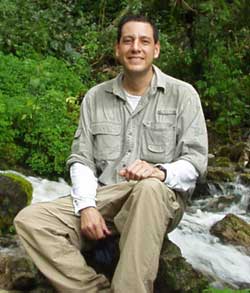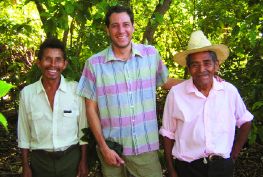 V. Ernesto Méndez is Associate Professor of Agroecology and Environmental Studies Agroecology and Rural Livelihoods Group (ARLG), Department of Plant & Soil Science and Environmental Programs at the University of Vermont
V. Ernesto Méndez is Associate Professor of Agroecology and Environmental Studies Agroecology and Rural Livelihoods Group (ARLG), Department of Plant & Soil Science and Environmental Programs at the University of Vermont
The field of agroecology has recently received increasing attention from a variety of stakeholders, including academics, policy-makers, development practitioners and farmers and their organizations. The roots of agroecology can be traced to the 1930s. In its original conceptualization, agroecology sought to integrate ecological concepts and principles to the design and management of agricultural systems. However, as interest in the field has grown, debates as to what it really means have emerged. I recently guest edited the inaugural special issue of the re-titled journal Agroecology and Food Systems (formerly Journal of Sustainable Agriculture), with my colleagues Chris Bacon and Rose Cohen, which will be open access for a limited time. Through this compilation of papers we tried to differentiate between different types of agroecologies, and to make a case for an agroecological approach that is grounded in transdisciplinarity, participatory action research and an interest in transforming existing agrifood systems. This may seem wordy to some, but it is worth teasing out the meaning of these terms and reflecting on their importance. We perceive transdisciplinarity as an approach that integrates different academic disciplines, as well as non-academic knowledge (e.g. experiential, cultural), and which is problem-oriented. Participatory action research seeks to bring together researchers and non-researches in an iterative process that includes investigating, reflecting and acting. Finally, by transformative, we mean that we are interested in changing the pervasive political economic structures responsible for a deteriorating agrifood system model.
 The University of Vermont (UVM) and the state of Vermont are ideal places to have these conversations. Since my arrival to UVM in 2006 I have seen important strides in research and action related to improving agrifood systems from farm to plate. These include the formation of the Food Systems Spire, the launching of the new master’s program in food systems and the establishment of practical offerings such as the farmer apprentice program, as well as the continuation of outstanding extension programs related to sustainable agriculture. From my end, I have sought to establish an agroecological program, grounded on participatory action research and service learning education. Our activities range from food security work in Latin America to offering semester-long, as well as study abroad and international agroecology offerings during the summer. Outside of UVM, Vermont exemplifies a state committed to attaining a more sustainable food system. This ranges from the many farmers that are working hard to produce while taking care of the land, to landscape scale endeavors like the Intervale, as well as state-wide initiatives such as Farm to Plate and the Vermont Working Landscape Partnership.
The University of Vermont (UVM) and the state of Vermont are ideal places to have these conversations. Since my arrival to UVM in 2006 I have seen important strides in research and action related to improving agrifood systems from farm to plate. These include the formation of the Food Systems Spire, the launching of the new master’s program in food systems and the establishment of practical offerings such as the farmer apprentice program, as well as the continuation of outstanding extension programs related to sustainable agriculture. From my end, I have sought to establish an agroecological program, grounded on participatory action research and service learning education. Our activities range from food security work in Latin America to offering semester-long, as well as study abroad and international agroecology offerings during the summer. Outside of UVM, Vermont exemplifies a state committed to attaining a more sustainable food system. This ranges from the many farmers that are working hard to produce while taking care of the land, to landscape scale endeavors like the Intervale, as well as state-wide initiatives such as Farm to Plate and the Vermont Working Landscape Partnership.
Agroecological conceptualizations go beyond academic jargon. They are the result of an evolution of agroecological thought that draws not only from the knowledge of researchers, but also the farmers, extensionists, processors, retailers and consumers that make up the agrifood system. They open the door for a research practice done in partnership with agrifood system stakeholders, which embraces the interrelated social, economic and cultural challenges that we face if we are to transform our currently broken agrifood system to a more sustainable one. Doing this type of research and the action that stems from it is challenging. First and foremost, it requires that both researchers and non-researchers partners prioritize working and communicating with each other. Agroecology can provide a platform for this, but the first step is recognition that resolving our current agrifood system issues requires a respectful and action-oriented dialogue between all the different players, from farm to plate.










